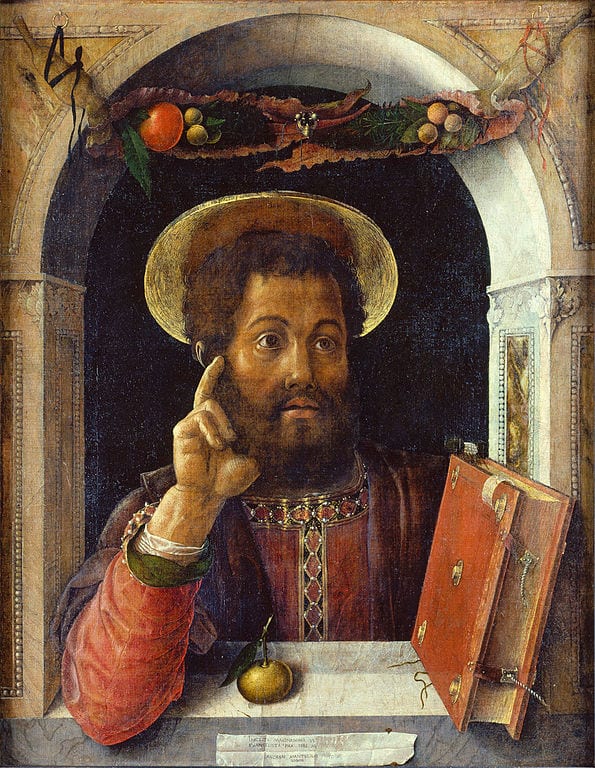
Atheist anti-theist Jonathan M. S. Pearce is the main writer on the blog, A Tippling Philosopher. His “About” page states: “Pearce is a philosopher, author, blogger, public speaker and teacher from Hampshire in the UK. He specialises in philosophy of religion, but likes to turn his hand to science, psychology, politics and anything involved in investigating reality.” .
*****
I am replying to the post on Jonathan’s site: Gospel of Mark’s Poor Jewish Knowledge (3-3-21), written mostly by Steven Carr, and extracted from another page. Steven Carr’s words will be in blue.
Time and time again, we see Matthew correcting Mark’s blunders about Judaism. Clearly Matthew was a Jew and Mark, despite Papias’ bold assertion, was not very close to the Jerusalem Church.
Most Christian Bible scholars believe that the Gospel of Mark was directed towards Gentiles, whereas the Gospel of Matthew was primarily written for a Jewish audience. I suspect that this will be most of the alleged “conflict” that Mr. Carr will be trying to “whip up” into yet more Bible contradictions. Christians believe that each Gospel had its own emphases and style. We have no problem accepting these differences. It doesn’t follow, however, that they automatically add up to “contradictions.” Let’s look and see what Mr. Carr can offer by way of argument.
Comparing Matthew 15:4 with Mark 7:10, Mark represents a more Gentile attitude in quoting the Old Testament as “Moses said” rather than “God said.” Matthew, a Jew, would never have attributed the 10 commandments to Moses. It was God who said them, as all Jews will tell you.
This is much ado about nothing. The Hebrews thought in “both/and” terms (St. Paul’s writings often reflect this). For them, the Law of Moses or Mosaic law was God’s Law. The two are identical. It was dictated by God to Moses, who delivered it to the ancient Hebrews. The context of Mark 7:10 clearly shows this. While 7:10 has Jesus referring to “Moses said” while referring to the Ten Commandments, both 7:8 and 7:9 use the terminology “the commandment of God” in referring to the same thing. 7:10 refers to the prior notions by starting with the connecting word “For.” 7:13 also references “the word of God” in discussing the same general topic.
Nor is the converse true about Matthew, who makes references to Moses’ teachings and his (God’s) Law as well:
Matthew 8:4 (RSV) [Jesus speaking] . . . offer the gift that Moses commanded . . .
Matthew 19:8 He [Jesus] said to them, “For your hardness of heart Moses allowed you to divorce your wives, but from the beginning it was not so.”
The parallel passage in Mark about divorce has Jesus saying:
Mark 10:3-5 He answered them, “What did Moses command you?” [4] They said, “Moses allowed a man to write a certificate of divorce, and to put her away.” [5] But Jesus said to them, “For your hardness of heart he wrote you this commandment.
Both books make reference to Moses commanding that which was God’s Law given to him. They both do both things. It’s not one vs. the other. St. Paul continues the “both/and” practice in his epistles, since he refers to the “law of Moses” twice (Acts 13:39; 1 Cor 9:9) and the synonymous “law of God” twice (Rom 7:22, 25). Moreover, in the Old Testament (not including the Deuterocanon), “law of Moses” is used 13 times, and “law of God” four times, as well as the similar “law of the LORD” another 18 times. We must conclude, then, that this point of argument is a false dichotomy. Context and cross-referencing demolish it.
Mark 5:22: “One of the rulers of the synagogue.” Diaspora synagogues may sometimes have had more than ruler, as at Pisidian Antioch (Acts 13:15), but Palestinian synagogues normally had only one. Matthew 9:18, drops this phrase.
There were indeed multiple “rulers” of Jewish synagogues at this time, as the following article establishes:
I. In one respect the ancient service of the synagogue differed very considerably both from that of a modern Christian service and from the service of the modern synagogue: The principal parts of the service were taken not by permanent officers of the synagogue, but by members chosen from the congregation after it had assembled. The permanent officers of the body included the Zequenim, “rulers of the synagogue ” (Mark 5:22; Acts 13: 15) who had judicial functions as well as religious, and a Chazzan, or ” attendant ” (Luke 4:20), who had charge of the building and in the service performed functions somewhat like those of a deacon in a modern non-ritualistic church. The service was under the direction of the Rosh-ka-Kenesetl or chief ruler (Luke 13 : 14), though his share in the service was for the most part a silent one. (“The Ancient Synagogue Service”, Ernest De Witt Burton, The Biblical World, Aug., 1896, citation from p. 144)
Somehow Mark got that right after all. Matthew 9:18 using “a ruler” doesn’t prove that Jairus was a sole ruler, anyway, since a sub-group of [plural] rulers (Zequenim) would be consistent with one of them being called a “ruler.” So this “point” really proves nothing at all.
Mark 14:12: On the first day of unleavened bread when they sacrificed the Passover, confuses Nisan 15 with Nisan 14. Naturally, Matthew 26:17 drops the phrase “when they sacrificed the Passover”. Was Mark a Jew who did not know about the Passover?
Matthew 26:17 also states: “on the first day of Unleavened Bread” and the disciples “prepare” the Passover, which they observe with Jesus that same night (26:17-21). No difference whatsoever, that I can see. Luke, definitely a Gentile, writes precisely as Mark does:
Luke 22:7-8 Then came the day of Unleavened Bread, on which the passover lamb had to be sacrificed. [8] So Jesus sent Peter and John, saying, “Go and prepare the passover for us, that we may eat it.”
Jesus then says: “I have earnestly desired to eat this passover with you before I suffer;” (22:15). For further clarification see: “The Date of the Passover Sacrifices and Mark 14:12” by Maurice Casey (Tyndale Bulletin 48.2 [1997]). Apologist Jeff Miller adds:
The Passover lamb was to be killed at twilight (i.e., sunset) on the evening of the 14th day of Nisan, the first month of the Jewish calendar (Ezekiel 45:21). The lamb was then to be eaten that same night with unleavened bread (Exodus 12:6-8; Numbers 28:16-17; Leviticus 23:5-7), leaving none of it until morning—burning any remains (Exodus 12:10). Unleavened bread was then to be eaten every day until the 21st day of the month at evening (Exodus 12:18). No leavened bread was even to be in an Israelite house for that week, or those individuals would be “cut off from the congregation of Israel” (Exodus 12:19).
The language of Matthew, Mark, and Luke leaves little doubt that the Passover lamb was killed by the apostles on Thursday afternoon of the crucifixion week, which was the 14th of Nisan, and that Jesus then immediately ate the Passover meal that evening on the 15th of Nisan in keeping with the Law of Moses (cf. Matthew 26:17-21; Mark 14:12,16-18; Luke 22:7-9).
Mark 14:13 says that the disciples were to be met by a man carrying a pitcher of water. Matthew 26:18 drops the idea that a Jewish man would do a woman’s work.
Luke 22:10 also indicates a man carrying water. Matthew simply doesn’t mention it. Silence on or omission of a matter is not logically the same as a contradiction. It was customary in ancient Israel for women to carry water jugs on their heads, I agree. But I don’t see that men were forbidden to do so, or that it is solely “woman’s work.” Hence, Deuteronomy 29:11 refers to “he who draws your water.” Here is a plausible explanation of what was going on in these Bible passages:
A man walking around with a jar of water was a very unusual sight, as this was ordinarily women’s work. Why would a man be carrying a water jar in Jerusalem? The only group of Jewish men that traditionally did carry water jars were Essenes. Essenes were mostly celibate, and their men did women’s work. They had their communities, not only in Qumran, but in various towns. They also had a community in Jerusalem.
One of Jerusalem’s gates was called “the Gate of the Essenes”. It was through this gate that they entered their community. When Jesus told His disciples that they will see a man carrying a water jar, he knew they would enter through the Essenes’ gate. Entering through this gate was crucial to finding a room for the Passover meal. The Essenes’ calendar was different than the regular Jewish one, and, therefore, they still had available guest rooms. (“The Man with the Jar of Water: The Jewish Background of
the New Testament”)
Mark 15:42, “When evening was already come, because it was Friday (paraskeue) that is, the day before the sabbath …” . This means “either that Friday began with that sunset, and Jesus had died on Thursday; or else, the evangelist forgot [or did not know] that the Jewish day began at evening.” Matthew 27:57-62 clarifies Mark’s confusion over Jewish days. Interestingly, the NIV tries to translate the problem away by writing for Mark 15:42 ‘So as evening approached“, rather than “and when evening had come“, as the RSV has it.
Apologist John Fraser writes:
What must be noted, however, is that all four Gospels say explicitly or implicitly that Jesus was crucified on the day of preparation. In Mark we read this of the evening after the crucifixion: “When evening had already come, because it was the preparation day, that is, the day before the Sabbath . . .” (Mark 15:42). So Mark explicitly says that Jesus was crucified on the day of preparation, agreeing with John. Luke is also explicit, giving this statement about when Jesus was taken down from the cross and buried: “It was the preparation day, and the Sabbath was about to begin” (Luke 23:54). Thus Luke also agrees that Jesus was crucified on the day of preparation. Finally, Matthew directly implies the same thing in Mat. 27:62): “Now on the next day, the day after the preparation, the chief priests and the Pharisees gathered together with Pilate . . .” Matthew says that the day after the crucifixion was the day after the preparation, which means Jesus was crucified on the day of preparation just as Mark, Luke, and John also say. Mark’s Gospel includes the explanatory note that the preparation day was the day before the Sabbath, which would mean Friday. It’s also worth noting that the Greek word for preparation (paraskeue) is the modern Greek name for Friday. Thus the most likely reading is that all four Gospels say that Jesus was crucified on the Friday of Passover week. But John and the Synoptics are in full agreement on this point. (“The Discrepancies of Bart Ehrman Examined”, Christian Apologetics Alliance, 11-2-12)
Catholic apologist Karlo Broussard elaborates:
The phrase “day of Preparation” is a Jewish idiom for Friday, the day that Jews made preparations for observance of the weekly Sabbath.
All three Synoptics use the idiom this way and say Jesus died on that day. Mark is explicit: “And when evening had come, since it [the day Jesus was crucified and died] was the day of Preparation [Greek, paraskeuē], that is, the day before the Sabbath” (Mark 15:42; emphasis added).
Luke is explicit as well. In reference to the day of Jesus’s crucifixion and death, he writes, “It was the day [hēmera] of preparation [paraskeuēs], and the sabbath was beginning” (Luke 23:54).
Matthew’s use of paraskeuē is a bit more implicit. He identifies the day Jesus died to be “the day of preparation” (Matt. 27:62). (“The Timing of Jesus’ Death”, Catholic Answers, 4-8-20)
Much ado about nothing (as almost always with these atheist “contradictions”). This one is so desperate that Mr. Carr sinks to claiming that “the NIV tries to translate the problem away.” There is no problem in the first place! The Greek word involved, ginomai (Strong’s word #1096) has a wide range of meanings, as one can readily see by following the link I just provided (which gives all 671 New Testament occurrences). The basis meaning is “to come into being, to happen, to become.” But the application of the word is so wide in its subtleties and nuances that here is how many ways that the NASB (similar to the RSV: I have done massive Bible-reading in both versions) translated this one word:
accomplished (1), appeared (3), arise (1), arises (2), arose (6), arrived (3), became (53), become (83), becomes (8), becoming (2), been (12), been brought (1), been done (1), been made (2), been…came (1), began (1), behaved (1), being (2), come into being (1), being carried (1), being done (2), being made (2), born (5), breaking* (1), came (45), came into being (2), came to pass (2), come (16), comes (1), comes to pass (1), coming (1), dawn (1), decided* (1), developing (1), done (20), drawing (1), during (1), elapsed (1), existed* (1), falling (1), feeling (1), fell (6), finished (1), followed (1), formed (3), found (2), get (4), give (1), got (1), granted (1), grown* (1), had (1), happen (6), happened (46), happening (5), happens (3), has (3), join* (1), joined (3), made (15), occur (3), occurred (18), performed (4), prove (7), proved (6), proving (1), put (1), reached (2), realized (1), results (2), show (1), spent (1), split (1), spoken (1), starting (1), take place (16), taken (2), taken place (5), takes place (1), taking place (3), there arose (1), thundered* (1), took place (7), turned (1), turns (3), would (1).
One can readily see that “approached” and “had come” are well within the range of possible translations. It’s the translator’s judgment. The NIV rendering is a minority position among translators but still seems quite permissible, in light of the above. I found four others that had similar renderings:
Good News getting on toward evening
Barclay already late in the day
Kleist & Lilly now late in the afternoon
Weymouth towards sunset
But to accuse a team of translators (and now, in effect, five different ones) of deliberate distortion for the sake of a nefarious agenda is really stretching it: especially with a word like ginomai.
Mark 15:46 says that that same evening Joseph of Arimathea “bought a linen cloth.” Matthew drops the idea of a Jew buying something on the Sabbath. No Jew could have made that mistake.
This, too, is a nothing burger. I dealt with this very charge just two days ago in my previous reply to Jonathan. For readers’ convenience, I’ll paste it here:
Theology Web hosted a discussion on this non-issue (“Joseph of Arimathea Buying Linen On Passover?”) in which one of the commenters shredded this “gotcha” question:
The imagined issue here is that it was illegal to work and to buy or sell goods on Passover per the following passages: [cites Ex 12:16; Lev 23:6-7; Neh 10:31]
Joseph, who was prominent on the council, would appear to be publicly breaking Jewish law by buying linen on Passover, and he couldn’t do it on the Sabbath (which was the next day) either. There appear to be a number of solutions to this issue though. So, starting with NT scholar Harold Hoehner, “The purchases of Joseph of Arimathea were proper for necessities could be obtained on the Sabbath (and on a feast day).” His source for this is Mishnah Shabbath 23.4[:] “One may await the dusk at the limits of the techoom, to furnish what is necessary for a bride and for a corpse, and to bring a coffin and shrouds for the latter.” “By ‘techoom’ is meant the distance of 2,000 ells [7,500 feet] which a man may traverse on the Sabbath, and refers to the limits of that distance.”
Hoehner also cites Gustaf Dalman’s Jesus – Jeshua: Studies in the Gospels (1929), where Dalman points out that these were extenuating circumstances. A criminal who had been hung (crucifixion was a type of hanging) had to be buried by nightfall to prevent the land from being defiled and burial on the Sabbath was likely not permitted. The body couldn’t lay out in the hot Judean environment for two days. It had to be buried,
So it turns out — again — that Mark is quite Jewish indeed: as Jewish as the Talmud. Mr. Carr just didn’t dig deep enough. He is, in the end, simply ignorant as to the matters under discussion (and I will continue to demonstrate this as I proceed). His only goal is to tear the Bible down, and anything goes towards that end.
Mark 1:2 wrongly ascribes Malachi 3:1 to Isaiah. Matthew 3:3 corrects this.
The Thinking and Believing site answers this:
Mark quotes from Malachi and Isaiah, and the first quotation is from Malachi.
Some people allege that the writer of Mark’s Gospel simply misattributed the quote. In other words, Mark simply got it wrong.
But there are good reasons for thinking otherwise. And the reasons are not simply the desperate maneuvers of evangelicals trying to defend a high view of Scripture. They are reasons based on the literary conventions of the time.
A nice summary of the reasons to think that Mark was not making a mistake in Mark 1:2 is given here. It’s written by Rikk E. Watts, a New Testament scholar at Regent College in Vancouver.
Here’s a brief sketch of his reasons for thinking that Mark didn’t make a mistake:
- Throughout Mark’s Gospel, we see Old Testament passages being combined into one quotation, with each passage being used to interpret the other passage.
- When using a composite quotations, it was common practice to cite the most important passage. The most important passage would be the one that was being used to shed light on the other passage(s).
- Why, then, was Malachi quoted first? Why not first quote the more important passage? The Malachi passage has a more prominent use of “messenger.” Also, the Malachi passage has the “Behold…” statement, which fits best at the beginning of the quotation.
I encourage you to read Watts’ more detailed explanation.
Matthew doesn’t “correct” Mark, because Matthew simply cited Isaiah only (40:3). He omitted the Malachi portion (3:1; cf. 4:5) that Mark included, per the literary customs of the time, as explained above. It was fine and dandy for Matthew to cite Isaiah only, and equally permissible for Mark to cite Isaiah and Malachi and refer to it under the name of one prophet.
Once again, one must become more familiar with the culture and customs of that time and place to properly understand these things (which was the topic of a recent paper of mine).
In Mark 2:7 the teachers of the law complain that Jesus is forgiving sins and say ‘Who can forgive sins but God alone?’. Jews did not think that. Matthew 9:3 drops the phrase. There is a Dead Sea Scroll called ‘The Prayer of Nabonidus'(4Q242) , written and copied by Jews, where it is said by Nabonidus ‘… an exorcist pardoned my sins. He was a Jew…’. Jews did believe that God could give authority to men to forgive sin.
Luke also has “Who is this that speaks blasphemies? Who can forgive sins but God only?” (5:21). These men had a point, from Scripture:
Exodus 34:6-7 . . . “The LORD, the LORD, a God merciful and gracious, slow to anger, and abounding in steadfast love and faithfulness, [7] keeping steadfast love for thousands, forgiving iniquity and transgression and sin . . . (cf. Num 14:20)
1 Kings 8:34 then hear thou in heaven, and forgive the sin of thy people Israel, . . .
Psalm 25:7, 11, 18 Remember not the sins of my youth, or my transgressions; according to thy steadfast love remember me, for thy goodness’ sake, O LORD!. . . [11] For thy name’s sake, O LORD, pardon my guilt, for it is great. . . . [18] . . . forgive all my sins. (cf. 32:1-2, 5; 51:9; 65:3; 79:9; 85:2; 99:8; 103:12; 130:4)
Isaiah 43:25 “I, I am He who blots out your transgressions for my own sake, and I will not remember your sins.” (cf. 1:18; 6:6; 44:22; 55:7)
Micah 7:18 Who is a God like thee, pardoning iniquity and passing over transgression
Jesus, being God, could of course forgive, but He also appointed his disciples (the models of priests) to be able to forgive the sins of people (absolution) as His representative (Mt 18:18; Jn 20:23; 2 Cor 2:10). Similarly, Moses made “atonement” for his people’s sin even in the old covenant (Ex 32:30-32; Num 14:19-23; 16:46-48), and others like Phinehas (Num 25:6-13) and Nathan (2 Sam 12:13-14) did the same. This is what these men missed. It’s more of the Hebrew “both/and” way of thinking. This explains what Mr. Carr thinks is a conundrum or contradiction. It’s true that no one “can forgive sins but God alone.” It’s also true that God can exercise this forgiveness through agents or representatives.
But (here’s the clincher) Matthew 9:3 is not expressing anything different from Mark and Luke in the first place:
Matthew 9:2-3 And behold, they brought to him a paralytic, lying on his bed; and when Jesus saw their faith he said to the paralytic, “Take heart, my son; your sins are forgiven.” [3] And behold, some of the scribes said to themselves, “This man is blaspheming.”
Now why is it that the scribes thought Jesus was “blaspheming”? Obviously because He forgave this man’s sins! This was obviously Matthew’s thrust in his version of the same story. If they thought that was blasphemy, then they must have been thinking of Old Testament passages like the ones above, showing that only God can do so. And it would mean, furthermore (so they thought), that Jesus was somehow claiming to be God in so doing.
The meaning in Matthew is precisely the same as in Mark and Luke, by inexorable deductive reasoning: He’s “blaspheming” because He was forgiving sins: something only God (broadly speaking) could do. What they had wrong was not that idea (we ultimately transgress against God when we commit any sin), but rather, the notion of a man representing God in forgiving men: something already seen in the Old Testament. They (presumably) didn’t know Jesus was claiming to be God yet at this point.
Mark 2:26 – Abiathar should be Ahimelech. Matthew 12:1-8 does not repeat the mistake. Incidentally, if Jesus was thinking of 1 Sam. 21:1-8 when he said that David and those who were with him were hungry, then, in his omniscience, he forgot that David was on the run alone and the story that David told Ahimelech was a falsehood – David was not on a mission from the king and he did not have an appointment with any young men.
Apologists Norman Geisler and Thomas Howe explain this:
First Samuel is correct in stating that the high priest was Ahimelech. On the other hand neither was Jesus wrong. When we take a closer look at Christ’s words we notice that He used the phrase “in the days of Abiathar” (v. 26) which does not necessarily imply that Abiathar was high priest at the time David ate the bread. After David met Ahimelech and ate the bread, King Saul had Ahimelech killed (1 Sam. 22:17–19). Abiathar escaped and went to David (v. 20) and later took the place of the high priest. So even though Abiathar was made high priest after David ate the bread, it is still correct to speak in this manner. After all, Abiathar was alive when David did this, and soon following he became the high priest after his father’s death. Thus, it was during the time of Abiathar, but not during his tenure in office.
At least six major Bible translations back up this interpretation. KJV and NKJV have “in the days of Abiathar” while NIV, NASB, NEB, and REB have “in the time of Abiathar”. Apologist Eric Lyons adds:
If someone today were to speak of how many Christians were imprisoned “in the days of Paul, the apostle,” it may be that he actually was referring to the time before Paul became an apostle, yet still referred to him as “Paul, the apostle.” Such language would not force one to conclude that the reference to the imprisonment of Christians must be confined to the time when Paul was an apostle. Similarly, since Jesus did not specifically say that Abiathar was the high priest who ministered to David, but simply that the event occurred during the lifetime of Abiathar (who later became the high priest), the allegation that Jesus erred is superfluous.
Lyons also tackles the bit about Jesus supposedly being wrong concerning David being with others during the showbread incident, etc.:
Ahimelech first asked David when the future king of Israel came unto him: “Why are you alone, and no one is with you” (1 Samuel 21:1)? If one were to stop at this point without considering subsequent verses, he may very well come to the conclusion that Jesus blundered in His reference to the events in 1 Samuel 21:1. However, following Ahimelech’s question (“Why are you alone?”), David informed him, “I have directed my young men to such and such a place” (21:2). Thus, although David may have entered the presence of Ahimelech without his men, he informed Ahimelech that he had directed them elsewhere while he visited with him. Ahimelech obviously understood David to mean that the men were not too far away, and were hungry, because he informed David that although he had no common bread to eat, there was holy bread, “if the young men have at least kept themselves from women” (21:4, emp. added). David responded by saying, “Truly, women have been kept from us…. And the vessels of the young men are holy” (21:5, emp. added).
To assert that Jesus erred in these two instances is to claim that which cannot be proven. The truth is, Jesus referred to this Old Testament event in a way very similar to how we converse today about various matters—whether using a figure of speech, called prolepsis, where we assign a name or title to a time that precedes it, or where we refer to someone being alone in one sense, and a part of a larger group at the same time. Such accusations appear to say more about the heart of the critic than the truthfulness of Jesus and the Bible writers.
Thus, context, and the usage of words resolves this alleged :difficulty.” Word of advice to anyone who attempts biblical exegesis: always (did I say, “always“?) — consult context (and cross-referencing is almost as important, too). Failing to do so will cause no end of embarrassment if someone of a different view critiques your stuff. Mr. Carr made reference to 1 Samuel 21:1-8. We can reasonably assume, then, that he actually read it. But if so, how could he possibly miss David’s allusion to companions in 21:2, 4, and 5? Only he can answer that if he ever replies to this (which isn’t likely). David also asked for “five loaves of bread, or whatever is here” (21:3). All Mr. Carr had to do was read and make an elementary logical deduction, to figure out that David wasn’t alone. He simply went alone to see the high priest.
It’s true that David “was not on a mission from the king”. He lied about it, as most commentaries affirm. But Jesus didn’t condone the lie; He referred only to eating the showbread. So that aspect is neither here nor there. Mr. Carr opines: “David . . . did not have an appointment with any young men.” The relevant text, on the other hand, reports David saying: “I have made an appointment with the young men for such and such a place” (1 Sam 21:2). Take your pick. I go with the Bible meself. I certainly don’t (so far) have much confidence in Mr. Carr’s ability to accurately and ably exegete biblical texts, with the showing he has made thus far. I’m not done with my analysis yet, and am answering as I read (as I often do), but I predict that he will do no better in his remaining examples.
Mark 10:19 misquotes the Ten Commandments and inserts an extra commandment: “Do not defraud.”
This is just silly. Jesus is adding nothing. He lists the five famous “thou shalt nots”: murder, adultery, stealing, false witness, and then says “do not defraud” instead of “do not covet.” It’s essentially the same thing. Merriam-Webster defines defraud as “to deprive of something by deception.” This is what comes as a result of covetousness. The same source defines covet as “to desire (what belongs to another) inordinately or culpably.” Jesus is always forward-looking in His application of the Jewish Law. This is similar to His teaching on the Sermon on the Mount: always going deeper:
Matthew 5:27-28 “You have heard that it was said, `You shall not commit adultery.’ [28] But I say to you that every one who looks at a woman lustfully has already committed adultery with her in his heart.
I think a similar “deeper analysis / getting to the heart or root of the matter” is going on here, as if Jesus is saying (by strong implication): “You have heard that it was said, ‘You shall not defraud’ [see, e.g., Lev 19:13] But I say to you that every one who covets has already committed defrauding in his heart.” Hence, Barnes’ Notes on the Bible comments:
Defraud not – Do not take away your neighbor’s property by fraud or dishonesty. To “cheat” or “defraud,” supposes a covetous desire of a neighbor’s property, and is usually attended with “falsehood” or “false witness” against a neighbor in obtaining it. It is thus a violation of the ninth and tenth commandments; and our Saviour very properly, therefore, “condensed the two,” and expressed their substance in this – not to defraud.
So “defraud not” is not “an extra commandment”: it’s an application of one or more existing ones, just as Jesus taught that lust was a variant — and indeed precursor — of adultery. He wanted to convey the heart-level roots of sin; not just the outward observance of moral laws.
Matthew 19:18-20 sticks to the original 10, plus the one that many Rabbis regarded as a summary of the commandments.
Matthew reports Jesus as noting (like Mark) murder, adultery, stealing, and false witness as part of the Ten Commandments. Then He mentions one more: “Honor your father and mother.” Then He mentions a precept that is not one of the Ten Commandments, but nevertheless might be said to sum up all of them: “You shall love your neighbor as yourself.” He didn’t name all ten here, anymore than He is said to have done in Mark.
In Mark He named four, then another which is either arguably referring to “do not covet” or else is a summation of several of the Ten Commandments. In Matthew He names the same four, adds one more, and then also a summation of several (or all) of the Ten Commandments (which Mr. Carr agrees is the case). I don’t see much difference here at all: if at all; certainly not contradictory difference. It’s much ado about nothing (what else is new?). So we move on to the next misguided bum rap . . .
Mark 15:34 has Jesus quoting Psalm 22:1 in Aramaic (Eloi). Had Jesus done this, bystanders could hardly have supposed that he was calling for Elijah. Jesus must have used Hebrew Eli, as at Matthew 27:46. The NIV tries to harmonize Matthew and Mark here by using Eloi in both places.
The Christianty.stackexchange site provides a very helpful reply:
The New Testament was written in Greek, but the Greek text records Jesus’ words in Aramaic (in Mark, Hebrew in Matthew). The Gospel writers transliterated the Aramaic (Mk 15) and Hebrew (Mt 27) into the Greek script.
It is important here to distinguish between script and language. For instance, I can write in Spanish, Latin, German, English, etc. all with (basically) the same Latin script, even though the languages are all different. And likewise, I can take the Hebrew word אֶל and transliterate it into Latin characters, ʾel. The language is still Hebrew, but the script is Latin.
Short answer: It’s Aramaic (or Hebrew in Matthew) transliterated into the Greek script. Since the text provides a Greek translation immediately thereafter, it makes sense that the translators would retain it.
The question at hand then becomes: which language was Jesus actually speaking from the cross in this instance? Both sides can make a good case, I think. Jesus normally spoke Aramaic, as most Jews in Israel in the first century did (this is — we might say — the Mark version). But in citing Old Testament Scripture, as He did here, one might argue that He would have cited it in the original Hebrew (the Matthew version). Matthew, in fact, reproduces the Hebrew text which is found in Psalm 22:1. The Hebrew version (importantly) seems to be more in line with hearers thinking He was calling for the prophet Elijah (I am in partial agreement with Mr. Carr in this respect). Eloi is never a designation for Elijah the prophet, whereas Eli is.
Christianity Today adds to the frustrating (but rather fascinating) confusion:
Q: In what language was the Bible Jesus read?
A: If, as most scholars today believe, Jesus spoke primarily in Aramaic, though he sometimes might have also used Greek and perhaps even Hebrew, what Bible was he likely to have read and heard read in the synagogue? The answer is that he likely heard Scripture read in Hebrew and occasionally in Greek, and then paraphrased and interpreted in Aramaic. How much of this paraphrase was actually written down in Jesus’ day is difficult to tell. It is probably safer to assume that most of this Aramaic tradition circulated orally and only generations later was committed to writing.
We’re still left with the same question: Was Jesus speaking Hebrew in citing Psalm 22:1 on the cross (Matthew) or paraphrasing Psalm 22:1 and speaking Aramaic, as He usually did (Mark)? Even the two variant readings in these Gospels don’t definitively settle the question, since they simply chose to transliterate variously from Aramaic and Hebrew, but neither version proves what was actually spoken by Jesus. Jesus definitely didn’t speak modern English, but this is how we Americans read what He said (which is the point).
Even if in fact Jesus spoke Hebrew in this instance, due to citing the Old Testament, it doesn’t automatically make Mark’s Gospel and his rendering here a “lie” or incompetent. Obviously, he chose to transliterate in Aramaic because that’s what Jesus normally spoke. There’s nothing wrong or unethical or incompetent in that. In the end, I’m inclined that Jesus spoke Hebrew in this instance because he cited Hebrew Scripture, and because of the “Elijah” argument. But I don’t think this proves some error or misleading on Mark’s part. I agree with the following apologetics analysis as to why I take the position I do:
Jesus probably spoke it in Hebrew. Why therefore is it recorded in Aramaic as well? Jesus was part of a multilingual society. He most probably spoke Greek (the common language of Greece and Rome), Aramaic (the common language of the Ancient Near East) and Hebrew, the sacred tongue of Judaism, which had been revived in the form of Mishnaic Hebrew in Second Temple times. Hebrew and Aramaic are closely related Semitic languages. That Hebrew and Aramaic terms show up in the Gospels is, therefore, not at all surprising.
That one Gospel writer records it in Hebrew and another in extremely similar Aramaic is no problem to Christians, nor is it a criticism of the Bible. The simple reason for the difference is probably that when one of them remembered and discussed the happening of Jesus’ life, death and resurrection, this phrase may well have been repeated in their conversation as Aramaic, which would be perfectly normal. So he wrote it down as such.
Mark 7:31 says that Jesus and his disciples journeyed “out from the borders of Tyre … through Sidon, to the sea of Galilee, through the midst of the borders”. The journey described is like “travelling from Cornwall to London by way of Manchester” (Anderson, H. The Gospel of Mark, NCB (London, 1976).
Craig Dunkley, from the Logic & Light site, shreds this:
[I]t’s entirely possible that Jesus had some reason for going to Sidon before heading down to the Sea of Galilee! The narrative simply doesn’t give us enough information to know for sure. Jesus had been travelling around the region, and Sidon may have been a planned part of his circuit. To automatically presume that the author made an error strikes me as bias in the extreme. . . .
[Dave: even a quick perusal of a map of the missionary journeys of Paul confirms that long, ongoing journeys of religious mission are often “jagged” in their routes]
[S]cholar Tim McGrew adds yet another piece of information. He reminds us that there is a mountain (Mt. Meron) standing nearly 4,000 feet high directly between Tyre and the Sea of Galilee. He adds: “There is a pass from Sidon through the mountains to the Jordan river valley, where foot travelers to Galilee could have fresh water for the journey.” According to McGrew, it would have been easier for Jesus to go a bit out of his way to avoid climbing Mt. Meron and to remain close to fresh water for the journey. [Alleged Historical Errors in the Gospels (Matthew & Mark), 5-21-12]
Mark 8:10 refers to the “the district of Dalmanutha.” As far as is known, there was no such place in Galilee. (The difficulty was recognized early because there are many textual variants in the manuscripts.)
Commentators freely admit that there is little known about this place-name from Mark. I don’t see, however, that this is proof that such a town never existed. Many biblical places or items previously mysterious have ben illuminated by scores of archaeological findings. Matthew 15:39, the parallel verse, gives us our only biblical geographical clue: “he got into the boat and went to the region of Mag’adan.” That provides at least something to work with and from. Magadan is an alternate name for Magdala: where Mary Magdalene was from. This town is known to have been located on the western shore of the Sea of Galilee: between biblical Capernaum and Tiberias.
It so happens that archaeologists have indeed found an ancient town that fits the bill, and “may be Dalmanutha”: since it was “about 500 feet (150 meters) away from” Magdala (“Biblical-Era Town Discovered Along Sea of Galilee”, Owen Jarus, LiveScience, 9-16-13). So if Matthew can be trusted, and Dalmanutha was in “the region of Magadan” then this could very well be Dalmanutha. Moreover:
The archaeologists also determined that a famous boat, dating to around 2,000 years ago, and uncovered in 1986, was found on the shoreline of the newly discovered town.
Mark reports that Jesus departed a town after feeding the 4,000 and “getting into the boat again he departed to the other side” [of the Sea of Galilee] (8:13). There is evidence that the place where this feeding occurred was near the archaeological site of Kursi, on the eastern shore of the Sea of Galilee. (I visited this location in 2014). If so, it is almost directly across from Magdala and what may be Dalmanutha. This would harmonize with Matthew’s report of Jesus departing “to the other side”. Works for me . . . The archaeology and the biblical details line up perfectly.
Mark 5:1 specifies that the eastern side of the lake of Galilee is the country of the Gerasenes. This is more than 30 miles from a lake. This caused a lot of confusion as can be seen by the variety of names in the texts here. Matthew changed Mark’s Gerasenes to Gadarenes in Matthew 8:28. Gadara was a well-known spa only eight miles from the lake.
I dealt with this at great length, twice:
Gadarenes, Gerasenes, Swine, & Atheist Skeptics (7-25-17)
Demons, Gadara, & Biblical Numbers (vs. JMS Pearce) (12-18-20)
Mark 6:14-27 repeatedly refers to Herod Antipas as a “king.” Matthew commits this error only once (14:9). The correct title ‘tetrarch’ appears in Matthew 14:1, Luke 3:19, Luke 9:7, Acts 13:1, but not once in Mark’s Gospel.
James S. Jeffers provides an adequate reply:
The references in Mark and Matthew to Antipas as “King Herod” . . . follow the habit of the local people, who referred to him as king even though he never rose above the level of tetrarch. (The Greco-Roman World of the New Testament Era: Exploring the Background of Early Christianity, Intervarsity Press, 2009, p. 125)
So Mark simply chose to use the language of the common people, while Matthew validly used both titles: “tetrarch” in 14:1 and eight verses later, “the king.” The same duality of titles had happened in the case of John Hyrcanus II (d. 30 BC), who had actually been the King of Judea in 67-66 BC but only the ethnarch in the period of roughly 47-40 BC; yet was still called “king” by the masses during that time.
Mark 6:17 says that Antipas married the wife of his brother Philip. According to Josephus, Antiquities.18.5.4, she was actually the wife of a different brother.
Matthew 14:3 states the same thing, so this is not a “Mark vs. Matthew” scenario. I thank Mr. Carr for the Josephus reference, for it solves the “problem.” Here is the relevant portion of it:
Herodias, their sister, was married to Herod [Philip], the son of Herod the Great; who was born of Mariamne, the daughter of Simon the High Priest; who had a daughter Salome. After whose birth Herodias took upon her to confound the laws of our country, and divorced her self from her husband, while he was alive, and was married to Herod [Antipas], her husband’s brother by the father’s side. He was tetrarch of Galilee.
It’s confusing, I know. Wikipedia states about this “Herod II”:
the son of Herod the Great and Mariamne II, the daughter of Simon Boethus the High Priest. For a brief period he was his father’s heir. Some writers call him Herod Philip I (not to be confused with Philip the Tetrarch, whom some writers call Herod Philip II).
Herod was the first husband of Herodias, and because the Gospel of Mark 6:17 states that Herodias was married to Philip, some scholars have argued that his name was actually Herod Philip.
Hastings’ Dictionary of the New Testament (“Herodias”) adds:
Herodias was the daughter of Aristobulus (son of Herod the Great and Mariamne the Hasmonaean) and Bernice (daughter of Salome, Herod’s sister, and Costobar), and thus the full sister of Herod, king of Chalcis, and Agrippa i. (Ant. xviii. v. 4). She married first her half-uncle Herod, son of Herod the Great and Mariamne, the high priest’s daughter. In Mark 6:17 and Matthew 14:3 the first husband of Herodias is called Philip, the brother of Herod (Antipas). This Philip, therefore, most probably bore also the name ‘Herod’ (as did also his brothers Archelaus and Antipas), and is to be distinguished from Philip the tetrarch (Luke 3:1; cf. Matthew 16:13, Mark 8:27), who married Salome, the daughter of Herod Philip and Herodias (Ant. xviii. v. 4).
Now it’s even more confusing! The brackets in the translation of Josephus above (from the translator/editor, not Josephus) call him “Philip” just as in the same way “Antipas” is added in brackets (both men also being named Herod and called that by Josephus). That would seem to legitimize Mark’s usage of “Philip” as a name for this person. Wayne Jackson deals with name question and Mark and Matthew in relation to Josephus:
The fact that Josephus does not call him “Philip” means nothing. There is no legitimate cause for disputing Matthew and Mark merely on the silence of Josephus.
Furthermore, as a general observation, we may note that the Gospel writers are much better known for their accuracy than is Josephus.
This “Herod,” mentioned by Josephus, could also have had the name “Philip,” just as the “Herod” who murdered John was also called Antipas, and the “Herod” who killed James was known as Agrippa as well (Acts 12:1ff).
There is, therefore, no legitimate cause for questioning the New Testament narrative which identifies the initial husband of Herodias as “Philip.”
Mark 13:17-19 fails to urge Jesus’ followers to pray that they do not have to flee on the sabbath (compare Matthew 24:20).
So what? Mark didn’t mention one clause that Matthew mentions. Big wow. I’m tired of dealing with silence of one Gospel writer as supposedly some big “evidence” of a contradiction or one Gospel being inferior to another. These things prove nothing more than the fact that two writers, dealing with the same subject matter (whether they are inspired and writing Scripture or not), will present it in various different ways.
Mr. Carr thinks this is significant in showing that Matthew was much more Jewish than Mark, and that Mark was deficient. All it really shows, however, is that in a Gospel written primarily for Gentile readers, the aspect of the Sabbath was far less important, and so need not have been included. He may have been selective, in terms of the full sentiment that Jesus expressed, but there is no law saying that absolutely every word of a subject must be recorded or is required. The Gospel of John makes note of the necessary selectivity of Gospel writers, in its last verse (21:25): “But there are also many other things which Jesus did; were every one of them to be written, I suppose that the world itself could not contain the books that would be written.”
But it’s not like Mark never mentions the Sabbath. In fact, he mentions it eleven times, which is actually one more time than Matthew does (and in twelve less chapters, to boot). Therefore, it’s pretty silly for Mr. Carr trying to argue that Matthew’s Gospel is more Jewish than Mark’s Gospel in this respect. Luke was also concentrated on Gentiles, yet he mentioned the Sabbath 18 times, more than half again as much as Matthew and Mark, and almost as much as the two combined. So Mr. Carr’s theory in this instance falls completely flat, just as it has been shown to be false in every other example above.
Mark 2:23-28 lacks the appeal to the Mosaic Law found in Matthew 12:5.
This is factually untrue. Mark mentions “not lawful” in 2:24 and 2:26. That’s referring to the Mosaic Law, of course: as is the Sabbath, mentioned in 2:23-24, 27-28. Thus, the law of Moses is all through the passage, for those who look to see in the first place. Matthew’s parallel passage does much the same: he mentions the term “lawful” twice just as Mark does (12:2, 4). All he adds is “have you not read in the law?” (12:5), making the same point in a different way about supposedly — as the Pharisees wrongly thought — (but not really) breaking the Sabbath.
Mark 7:19b, a comment by the evangelist, asserts that Jesus “declared all foods clean.” Matthew 15:20 drops this. It is inconceivable that Jesus would have abolished the food laws without his opponents ever once mentioning that in accusations.
Jesus indeed declared the principle that Peter would later publicly declare (after receiving a revelation) that all foods were clean (Acts 10:9-16): a thing shortly afterwards codified at the Jerusalem Council as applicable to all Gentile Christians (Acts 15:19-20). The difference is that Jesus did it only with His disciples (Mark 7:17-23). He wasn’t Himself proclaiming “all foods clean” in so many words (let alone publicly). He simply taught the principle underlying that thought, and Mark made his “theological” comment about it.
Mark 9:4 names Elijah before Moses. Naturally, Matthew 17:3 puts Moses before Elijah, as Moses is far more important to Jews than Elijah.
Mark isn’t implying Elijah’s superiority; quite the opposite. He says, “there appeared to them Eli’jah with Moses.” That way of referring to their relation shows the preeminence of Moses. Peter, speaking in the next verse, then puts Moses before Elijah, in suggesting that booths could be made for them.
Mark 11:10 refers to the kingdom [of] our father David. No Jew would have referred to our father David. The father of the nation was Abraham, or possibly Jacob, who was renamed Israel. Not all Jews were sons of David. Naturally, Matthew 21:9 does not refer to our father David.
Nonsense. There is Jewish / Hebrew precedent:
2 Kings 16:2 Ahaz was twenty years old when he began to reign, and he reigned sixteen years in Jerusalem. And he did not do what was right in the eyes of the LORD his God, as his father David had done, (cf. 2 Chr 28:1) [Ahaz — as is estimated by scholars — reigned from somewhere between 744-715 BC: some 250 years after King David]
Acts 4:25 . . . our father David . . . [Peter speaking]
“Your father Abraham” only appears once in the Old Testament: God talking to Joshua (Josh 24:3; not counting Jacob referring to his grandfather: Gen 32:9). “Father Abraham” appears seven times in the New Testament, including four times from the Gentile Luke. But I’m not claiming that “father David” is more prominent in Scripture than “father Abraham.” I’m merely refuting Mr. Carr’s foolish universal negative: “No Jew would have referred to our father David.” The writers of 2nd Kings (Jewish tradition held that it was Jeremiah) and 2nd Chronicles (Jewish and Christian tradition say it was Ezra) did, and so did St. Peter. All quite Jewish authors, in any event. If the author of 2 Kings can do it, and Peter can, so can Mark: simply following that Jewish tradition.
Besides, Mark uses the phrase in the context of Palm Sunday, where the people saying this thought the messianic kingdom might be arising (Mk 11:10), and it is well known that David is also the prominent prototype of the Messiah in the Old Testament (see. e.g., ” ‘What do you think of the Christ? Whose son is he?’ They said to him, ‘The son of David’ “: Mt 22:42). So to refer to him in relation to Jesus is quite appropriate and equally “Jewish.” “Son of David” (in this vein) is applied to Jesus 16 times in the Gospels: ten of these in Matthew, including his description: “Jesus Christ, the son of David, the son of Abraham” (1:1). Yet we are to believe that Mark is somehow “less Jewish” by referring to “our father David”? It just isn’t so.
Mark 12:31,33,34 subordinate the Torah to love, and to the kingdom, in contrast to Matt. 22:36-40, who as a Jew, put a far greater emphasis on the Law.
I don’t see much difference at all. After all, in the passage Mr. Carr cites from Matthew, Jesus doesn’t even cite the Ten Commandments. Rather, He cites a portion of the Law that sums up “all the law and the prophets” (22:40):
Matthew 22:37-39 . . . “You shall love the Lord your God with all your heart, and with all your soul, and with all your mind. [38] This is the great and first commandment. [39] And a second is like it, You shall love your neighbor as yourself.”
He does similarly in another passage (paralleled in Luke 11:42 but not in Mark):
Matthew 23:23 “Woe to you, scribes and Pharisees, hypocrites! for you tithe mint and dill and cummin, and have neglected the weightier matters of the law, justice and mercy and faith; these you ought to have done, without neglecting the others.
That’s certainly putting the emphasis on love, rather than merely legal transactions. So is Mark much different than this? Mark 12:31-34 is basically the same as Matthew 22:37-39 above, and then Jesus adds: “to love one’s neighbor as oneself, is much more than all whole burnt offerings and sacrifices” (12:33). The thing is, the Law was meant to focus on love all along, and this is explicitly taught in the Old Testament, too. If Mr. Carr thinks that Mark is denigrating the sacrifices, he is saying nothing that hasn’t already been taught under the old covenant. So, for example:
Amos 5:21-24 I hate, I despise your feasts, and I take no delight in your solemn assemblies. [22] Even though you offer me your burnt offerings and cereal offerings, I will not accept them, and the peace offerings of your fatted beasts I will not look upon. [23] Take away from me the noise of your songs; to the melody of your harps I will not listen. [24] But let justice roll down like waters, and righteousness like an ever-flowing stream.
Jeremiah 6:20 . . . Your burnt offerings are not acceptable, nor your sacrifices pleasing to me.
Proverbs 21:27 The sacrifice of the wicked is an abomination; how much more when he brings it with evil intent.
When His people obeyed His commands, however, then God was pleased with the same sacrifices (see, e.g., Is 56:6-7: “their burnt offerings and their sacrifices will be accepted on my altar”; Jer 17:24-26: “But if you listen to me . . .”; Mal 1:11: “a pure offering”; many others).
So there is nothing “new” here in Mark, which is no different than Matthew. These themes had been there in Judaism and the existing Bible for many hundreds of years.
Mark never explains Gentile matters, such as who Pilate was. However, he assumes that his intended readers know even less about Judaism than he does and he has to explain the most elementary features.
That makes total sense if his intended audience is Gentiles.
By contrast, Matthew makes more use of Judaism and assumes his readers are up to speed.
That makes total sense if his intended audience is Jews.
Was Mark really a Jewish companion of Peter, or someone who was very close to the earliest, Jewish, followers of Jesus?
Yes, as I have consistently demonstrated above. But this doesn’t preclude a desire to reach out to Gentiles. That (along with Luke’s similar project) was as necessary as Paul’s missionary journeys, in order for Christianity to be a worldwide phenomenon and not just a local sect of Judaism.
Only Mark 12:42 explains that a lepton, a coin used in Palestine, was worth half a quadrans. Further more, “quadrans” is a word borrowed from Latin.
This is neither here nor there . . .
Mark 10:12 forbids women to divorce their husbands and remarry. But Jewish law already forbade that! The teaching would have seemed outlandish to a Jew of Palestine, but was an appropriate expansion for those of pagan background.
Reiteration in teaching is never a bad thing. Secondly, there were many people then, as now, who knew the Law, or the new Christian teaching, but deliberately violated it, anyway.
At Mark 3:17 and Mark 10:46, he has to explain the most elementary meanings of Aramaic surnames. This is supposedly from somebody to whom Aramaic was a mother tongue.
What he knew is irrelevant to the consideration of what Gentile readers (over 2000 years) would know. Thus, it makes perfect sense to clarify the meaning of a proper name in Aramaic. The usual atheist skepticism is unwarranted and silly. Every single argument in this paper has fallen flat, as I have now demonstrated.
Even if Mark is just explaining things to his readers, it is clear that his readers, being ignorant of elementary Aramaic and even the currency of Palestine, would have been in no position to check out any of the things that he wrote.
Straining at gnats . . .
Mark 6:48 uses ‘the fourth watch’. The Jews divided the night into three watches. The Romans divided the night into four watches, according to the conservative New Bible Dictionary. This is still more evidence that Mark’s Gospel was written for people who would have been familiar with Roman and not Jewish customs, and so would have found it hard to check the Gospel stories.
Yes; it was written for a Gentile audience. Why is this an issue at all?
There is nothing in Mark which a well educated Roman Gentile would not have known. For example, when Mark 15:38 talks about the curtain of the Temple, Roman Gentiles would have known that the Temple had a curtain, as it was taken to Rome after Jerusalem was sacked (Book 7, Chapter 5 in ‘Wars of the Jews’ by Josephus).
Why is it assumed that the book was intended primarily for “a well educated Roman Gentile” audience in the first place? It was written for the masses. Paul’s epistles are on a higher level, theology- and education-wise, but not the Gospels. Paul “does theology” and is writing to those who are already Christians, whereas the Gospels are “preaching the gospel” to non-believers. It’s the distinction between discipleship and evangelism.
***
Photo credit: St Matthew and the Angel (1620), by Guido Reni (1575-1642) [public domain / Wikimedia Commons]
***


























Thomas Howard Quotations
I owe my nurture to evangelicalism. The evangelical wins hands down in the history of the church when it comes to nurturing a biblically literate laity. When we think of evangelism, evangelicals are the most resourceful, the most intrepid, and the most creative. But evangelicals themselves would say that they have never come to grips with what the whole mystery of the church is. I don’t know whether I’ve ever met an evangelical who does not lament the desperate, barren, parched nature of evangelical worship. They’re frantic over the evangelical poverty when it comes to the deeper reaches of Christian spirituality and what the mystery of worship is all about. (Interview: “Why Did Thomas Howard Become a Roman Catholic?,” Christianity Today, 15 May 1985, 49)
*
Genuflection
*
*
*
*
*
*
*
*
*
*
*
*